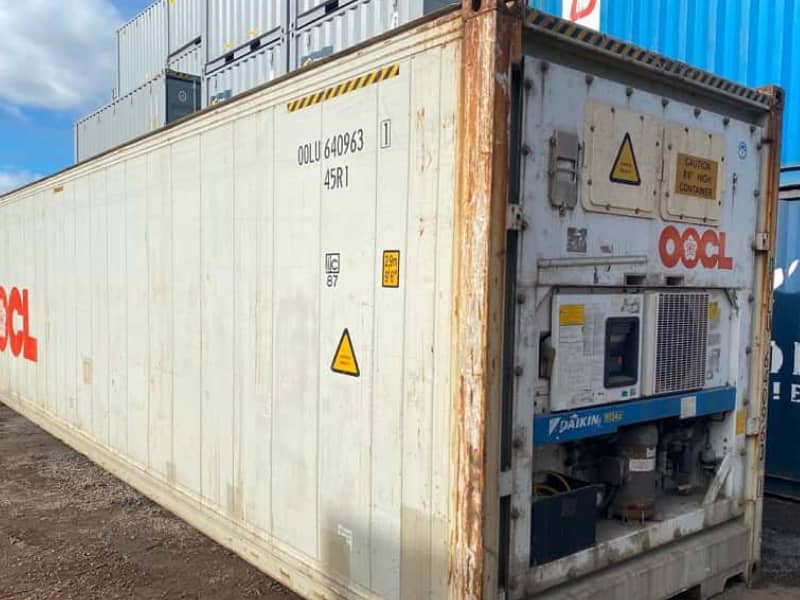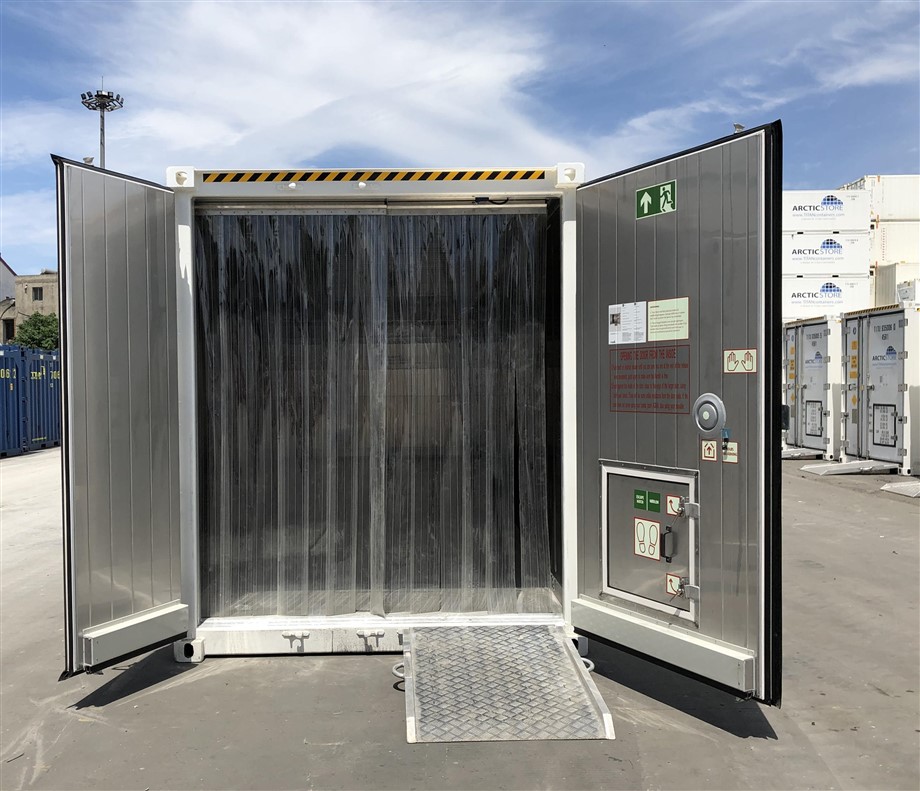All About Freezer Containers: Essential Insights for Your Storage Space Requirements
Cold store containers play an important role in the preservation of perishable items. They come in numerous kinds, consisting of chilled and protected units, each made for particular storage demands. Understanding the advantages and vital attributes of these containers is necessary for organizations aiming to maximize their operations. As the need for reliable storage space services grows, exploring the various choices readily available can result in educated choices that influence both profitability and sustainability. What aspects should one think about when picking the right container?
Sorts Of Cold Store Containers
Freezer containers been available in numerous types, each made to meet particular temperature level control requirements. Among the most usual types are chilled containers, which keep temperatures between 0 ° C to 10 ° C, making them suitable for perishable products like fruits, vegetables, and milk items. Another kind is the deep freezer container, which operates at temperature levels listed below -18 ° C, perfect for long-lasting storage space of icy items such as meats and fish and shellfish.
Insulated containers supply temperature level stability without energetic air conditioning, making them beneficial for temporary transportation of temperature-sensitive items. Additionally, there are mobile chilly storage systems, which provide adaptability in locations and are typically utilized in events or seasonal operations. Lastly, blast chillers rapidly lower the temperature level of hot foods, making certain safety and quality. Each type serves an one-of-a-kind objective in numerous sectors, from food solution to pharmaceuticals, emphasizing the value of selecting the right container for certain storage space requirements.

Advantages of Utilizing Freezer Solutions

In addition, freezer remedies extend the service life of items, lowering waste and boosting earnings for services. By successfully handling inventory with proper temperature level control, companies can enhance their supply chains and improve operational effectiveness.
Additionally, freezer facilities allow for adaptable storage space options, fitting various quantity needs and seasonal fluctuations sought after (used 40ft refrigerated shipping containers). This flexibility aids organizations respond rapidly to market adjustments
Last but not least, utilizing cold store options can assure conformity with health and wellness and safety and security guidelines, protecting both customers and companies. On the whole, the critical use of cold store enhances item management while advertising sustainability and financial stability.
Secret Attributes to Look for in Cold Store Containers
When choosing cold store containers, several essential features merit mindful consideration to safeguard peak efficiency and reliability. First, temperature level control capabilities are crucial; containers ought to maintain regular temperatures ideal for particular items. Insulation top quality also plays a considerable duty, as exceptional insulation minimizes energy intake and enhances temperature security.
Next, convenience of gain access to and loading is vital; containers must provide easy to use styles for reliable handling and company. Toughness is another essential element; weather-resistant products ensure long life and secure contents against ecological elements.
In addition, wheelchair features, such as built-in wheels or raising factors, promote transportation, while customizable designs enable tailored storage solutions.
Keeping an eye on systems, including temperature level alarm systems and remote monitoring, supply real-time updates, making specific that problems stay optimal. By concentrating on these functions, customers can pick cold store containers that fulfill their operational needs effectively.
Selecting the Right Cold Storage Container for Your Needs
Choosing the right freezer container requires a thoughtful evaluation of specific demands and operational demands. Factors such as the kind of products being saved, temperature sensitivity, and quantity ought to be prioritized. Subject to spoiling food things might require containers with rigid temperature controls, while drugs might require accurate problems to preserve effectiveness.
Furthermore, potential users should consider the container's size and wheelchair. A larger device may be required for mass storage, while smaller, portable options might be perfect for on-site or short-lived needs. Insulation high quality and energy performance are also essential, as these will certainly influence operational prices and temperature level stability.
Conformity with market regulations and requirements is necessary, specifically in fields like food and health care. By meticulously examining these aspects, customers can pick a freezer container that successfully fulfills their distinct requirements and warranties ideal storage problems.
Ideal Practices for Maintaining Cold Storage Issues
Preserving excellent cold store problems is vital for protecting the quality and safety and security of temperature-sensitive products. Routinely monitoring temperature level and humidity degrees is essential; utilizing dependable electronic thermostats and hygrometers can offer accurate readings. Appropriate insulation of chilly storage containers aids lessen temperature fluctuations and energy loss.
Carrying out a first-in, first-out (FIFO) system assures that older stock is made use of before more recent supply, minimizing waste (used 40ft refrigerated shipping containers). In addition, keeping an arranged design within the storage space enables for far better airflow and reduces the danger of cross-contamination
Routine maintenance examine devices, such as seals and compressors, are very important to protect against breakdowns. Personnel training on ideal techniques for loading and unloading items aids maintain temperature level integrity. Keeping doors closed as much as feasible limits heat exchange, assuring that the cool storage setting remains effective and steady in preserving beneficial items.
Price Considerations for Cold Storage Solutions
When assessing freezer services, it is necessary to think about the preliminary financial investment prices along with continuous functional expenses. A comprehensive failure of these expenses can disclose significant long-lasting cost savings possibility for services. Understanding these monetary facets assists stakeholders make informed choices concerning their cold store needs.

Initial Investment Costs
The monetary landscape of chilly storage space containers offers different preliminary investment prices that businesses must consider. These prices normally include the purchase or rental price of the containers, which can vary based on insulation, size, and type quality. Additionally, expenses associated with retrofitting existing frameworks to accommodate freezer needs to be factored in, especially if specialized devices is called for. Installment prices, including electrical work and refrigeration systems, additionally add to the overall first financial investment. Businesses need to not ignore transport expenses for supplying containers to their preferred location. Lastly, prospective personalization options, such as shelving or temperature surveillance systems, can better affect the first monetary investment. Mindful budgeting for these aspects is necessary for effective chilly storage space execution.
Functional Expenses Failure
Functional expenditures for cold store remedies incorporate a number of critical cost considerations that organizations need to browse. Key aspects consist of energy prices, which can be substantial as a result of the requirement to maintain low temperature levels. Upkeep expenditures are likewise considerable, as normal maintenance is essential to assure tools operates successfully and remains certified with health and wellness and safety standards. Additionally, labor prices may arise from the demand for specialized team to keep track of the storage space and take care of environment. Insurance coverage expenses are an additional factor to consider, as business should protect their investments versus prospective losses. Lastly, any type of prospective regulatory compliance prices should be factored in, as organizations might require to purchase systems that stick to food safety and security and ecological regulations. Understanding these costs is crucial for reliable budgeting.
Long-Term Savings Possible
Buying cold store options supplies considerable long-term savings possibility, transforming preliminary expenses into financial performance gradually. By decreasing perishing and waste, organizations can enhance their revenue margins significantly. Advanced insulation and energy-efficient systems reduce utility prices, which gather over the life-span of the equipment. Cool storage containers usually need much less constant maintenance compared to traditional refrigeration approaches, leading to reduced repair service costs. The capacity to shop products for prolonged periods without jeopardizing high quality enables businesses to maximize market fluctuations, maximizing revenue. Furthermore, the scalability of cold store services enables business to adapt to altering demands without incurring excessive prices. In general, these elements add to a compelling instance for cold store as a cost-effective financial investment method.
Regularly Asked Concerns
For How Long Can Food Be Stored in Cold Store Containers?
The duration food can be kept in cold store containers varies by kind. Normally, perishable here things last from days to weeks, while frozen foods can continue to be safe for months, relying on proper temperature level and storage space problems.
Are Cold Store Containers Energy-saving?
The power effectiveness of freezer containers differs based upon design and insulation quality. Modern systems frequently utilize advanced modern technology to decrease power usage, eventually adding to reduced operational prices and environmental influence in lasting usage.
Can Cold Storage Containers Be Personalized for Specific Demands?
Cold store containers can indeed be customized to meet specific requirements. Adjustments may include temperature controls, dimension changes, and extra functions, permitting users to customize remedies effectively for various storage space demands and functional choices.
What Are the Common Sizes of Cold Store Containers?
Freezer containers normally can be found in conventional sizes such as 10, 20, and 40 feet. These measurements accommodate various storage space needs, ensuring versatility for businesses requiring temperature-controlled atmospheres for sensitive materials or subject to spoiling goods.
Do Cold Storage Containers Require Special Licenses for Use?
Cold storage space containers frequently need unique authorizations for use, depending upon regional guidelines and intended applications. Authorities may mandate authorizations to ensure safety and security criteria, ecological compliance, and correct operational practices are kept throughout their use.
Cold storage space containers come in different types, each developed to satisfy specific temperature level control needs. Furthermore, chilly storage space facilities permit for adaptable storage space options, suiting various volume needs and seasonal fluctuations in need. Selecting the ideal cold storage container requires a thoughtful evaluation of particular needs and operational requirements. The monetary landscape of cold storage space containers provides different preliminary investment costs that services have to take into consideration. Cold storage containers can without a doubt be personalized to meet certain needs.